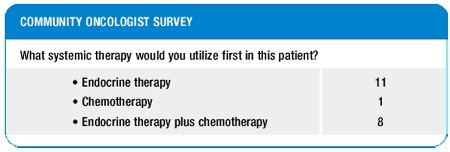| You
are here: Home: BCU 6|2001: Section 2

CHEMOTHERAPY VERSUS ENDOCRINE THERAPY
There is a bias away from hormonal therapy in young women with
visceral metastases, and I have a bit of a problem with that. In
an asymptomatic patient presenting with pulmonary metastases —
by definition, an incurable problem — our first obligation
is to treat her condition without producing untoward toxicity. If
she had symptomatic hepatic or pulmonary parenchymal metastases,
maybe it would be a disservice to give her a trial of hormonal therapy.
But, in a case like this, I think we owe the patient an 8- to 12-week
trial of hormonal therapy to establish her ability to respond. The
counter argument that hormonal therapies require too long to work,
and that a patient like this doesn’t have 8 to 12 weeks to
await the success or failure of a hormonal therapy is misguided.
This patient clearly was able to benefit from what turned out to
be a period of four-plus years from therapies that did her essentially
no harm and gave her an excellent quality of life.
—Kevin Fox, MD
In this patient, I would start with two cycles of an anthracycline-based
polychemotherapy regimen and re-evaluate. I would continue treatment
until maximal response and then consider hormonal intervention.
If she had a complete response and durable response to chemotherapy
— which is unlikely — one might consider stopping all
therapy and waiting for progression. When she has shown maximal
benefit to polychemotherapy, I would definitely consider hormonal
therapy.
In an ER/PR-positive patient, hormonal therapy is certainly something
to be considered up front. A number of people — mostly in academic
institutions — would espouse single-agent hormonal therapy
or single-agent chemotherapy in an incurable asymptomatic individual
with very valid reasons. This is perhaps a question of clinical
bias, but I believe that in a young, otherwise healthy woman, you
want to go for the biggest “bang for your buck” early
on. If anthracycline-based combination chemotherapy has the highest
response rates in metastatic disease, that’s where I would
be starting.
The issue of patient age does sway clinicians into treatment, and
some might say overtreatment. We tend to treat more aggressively
in younger patients. I don’t know that all clinicians would
treat her that way, but most clinicians in my circle, including
my partners, and other local colleagues, would probably treat with
polychemotherapy initially.
—Patricia Madej , MD
There are two major routes you can take. One is palliation —
keep her feeling as good as possible for as long as possible. I
would certainly use a chemotherapy that is easier in terms of side
effects or think about hormonal blockade. The other approach is
a more aggressive route including clinical trials with aggressive
induction chemotherapy followed by higher doses of chemotherapy
with stem cell support. Since we don’t know if there’s
any advantage to the higher doses, you could go either way depending
on the desires of the patient.
The choice really comes down to the kinds of risks patients want
to take. We can do transplants safely, and the patients are usually
back up to where they were before the transplant within a month
or two after completing therapy. I find that the people who pursue
this are usually young — 40 and less — tend to have limited
stage IV disease as their initial diagnosis and are minimally pretreated.
Many young patients with small children pursue this more aggressive
option on the chance that they will have less disruption to their
lives for a longer period of time. They know there is no guarantee.
We have two randomized trials of first-line high-dose therapy —
the Philadelphia and Canadian trials. I tell patients that it appears
that roughly nine months of maintenance chemotherapy is equivalent
to a single high-dose cycle with stem cell support 33-39.
In terms of the nontransplant option, depending on the number and
size of the pulmonary nodules, you could certainly try hormonal
therapy — either combined hormonal blockage with an aromatase
inhibitor and goserelin or tamoxifen. If I were starting chemotherapy,
I’d probably use capecitabine as my first choice.
—Linda Vahdat , MD
Hormonal therapy is underutilized in clinical practice for a variety
of reasons. In my training days, we did adrenalectomies and hypophysectomies
— major, fairly brutal surgical procedures with a lot of morbidity.
At that time, the first aromatase inhibitor we had, aminoglutethimide,
had a lot of side effects, and patients needed to take cortisone
with it. Then we went on to megestrol acetate with its fluid retention
and androgens, which women certainly don’t like taking. Now
we have a much better group of agents with many fewer side effects,
yet many oncologists remember hormonal therapy as something that
they did before they had the access to chemotherapy. It is a mistake
to skip hormonal therapy and go to chemotherapy, because you may
never get a chance to come back to hormonal therapy. If you select
your patients correctly, 60 to 70 percent will benefit from endocrine
therapy — this is as good as anything we do in current medical
oncology. This is palliation — keeping patients as comfortable
and functional as possible for as long as possible. Patients presenting
with symptomatic, rapidly progressive breast cancer need chemotherapy.
But if you put them into some degree of remission, you may well
be able to give them a chemo holiday and put them on one of the
new hormonal agents and to maintain the remission for a fairly long
period of time.
—Stephen Jones, MD

Page
3 of 6
Previous
page | Next page
|
